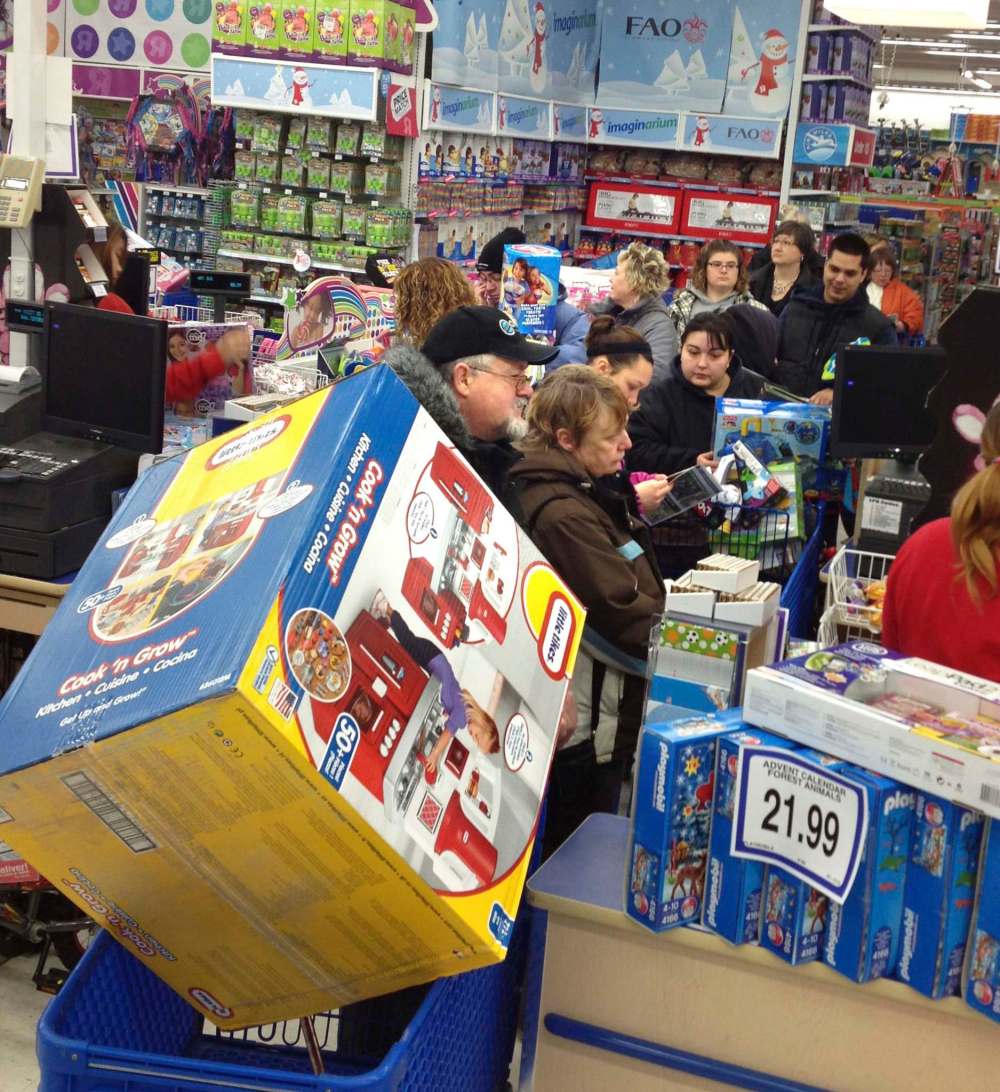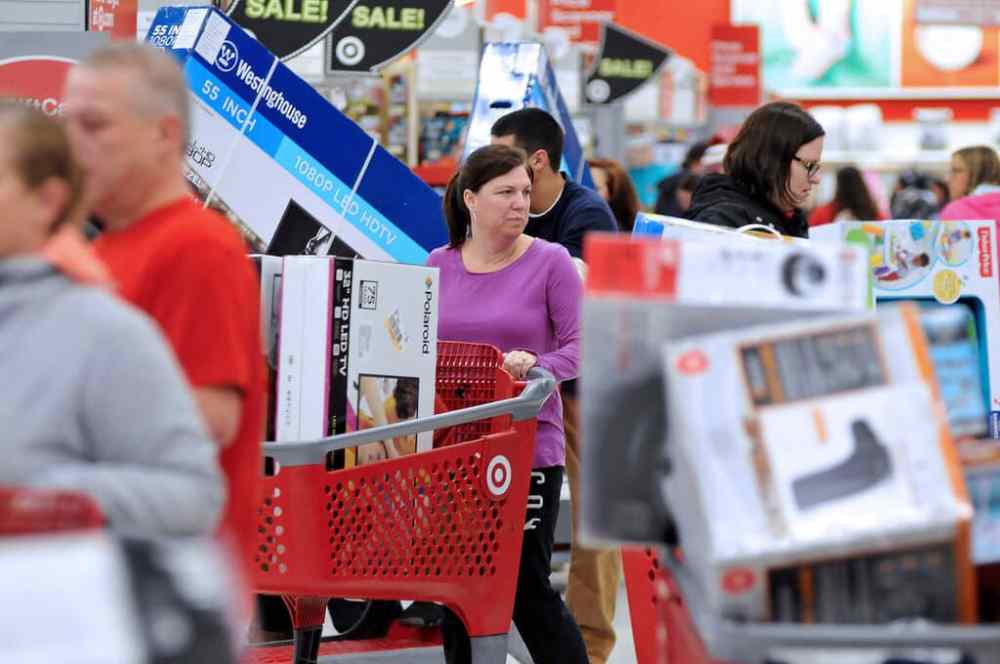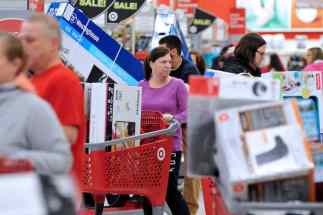Revenge of the shopper Cooped-up consumers expected to 'revenge spend' as shopping restrictions ease
Read this article for free:
or
Already have an account? Log in here »
To continue reading, please subscribe:
Monthly Digital Subscription
$0 for the first 4 weeks*
- Enjoy unlimited reading on winnipegfreepress.com
- Read the E-Edition, our digital replica newspaper
- Access News Break, our award-winning app
- Play interactive puzzles
*No charge for 4 weeks then price increases to the regular rate of $19.00 plus GST every four weeks. Offer available to new and qualified returning subscribers only. Cancel any time.
Monthly Digital Subscription
$4.75/week*
- Enjoy unlimited reading on winnipegfreepress.com
- Read the E-Edition, our digital replica newspaper
- Access News Break, our award-winning app
- Play interactive puzzles
*Billed as $19 plus GST every four weeks. Cancel any time.
To continue reading, please subscribe:
Add Free Press access to your Brandon Sun subscription for only an additional
$1 for the first 4 weeks*
*Your next subscription payment will increase by $1.00 and you will be charged $16.99 plus GST for four weeks. After four weeks, your payment will increase to $23.99 plus GST every four weeks.
Read unlimited articles for free today:
or
Already have an account? Log in here »
Hey there, time traveller!
This article was published 15/06/2021 (1638 days ago), so information in it may no longer be current.
Cooped up for months, economists say Canadian consumers are itching to do some revenge shopping.
And as governments across the country start to loosen restrictions and develop reopening plans, analysts are focusing their attention to assess whether all those dollars in pent-up savings will be used towards big-ticket purchases.
It’s a phenomenon known as “revenge spending” or “revenge buying,” which typically occurs after an unprecedented event causes people to look towards reclaiming their sense of normalcy. Essentially, it’s a way for people to make up for lost time, commonly out of spite and usually through retail therapy.

According to the Bank of Canada, there’s quite a bit of savings to go around for this type of spending. The central bank announced last month the gap between spending and wage expectations has never been so wide — which officials say is the result of households intending to spend one-third of their collective billions towards free-range items like retail purchases over the next two years, and only one-tenth towards paying down debt.
Yet, many surveys suggest otherwise — that the saving habits developed during the pandemic are here to stay. A Scotiabank report in May said 36 per cent Canadians are planning to eliminate unnecessary spending from their lifestyle after COVID-19, and that 28 per cent will keep building their saving funds.
That’s why leading customer-engagement insights company Jackman Reinvent Inc. wanted to analyze revenge spending more closely, among many other emerging consumer trends. The firm will release its findings for the “Human Insights Study” later this week, but gave the Free Press an early look.
“What we really wanted to see was whether all this talk about revenge spending actually met the data,” Steve Nicosia, co-author of the upcoming study and director of human insights at Jackman, said in an interview Tuesday.
“Interestingly, there are actually equal number of people that we found want to splurge on bigger items as there are those that don’t.”
– Steve Nicosia
“Interestingly, there are actually equal number of people that we found want to splurge on bigger items as there are those that don’t.”
Nicosia says this took him by surprise because “for the last several months, we’ve all been hearing about the idea that if people aren’t spending money and putting it on paying down their bills, then where will that money go? Will it come back to the stores and come to them through foot traffic?
“I guess, the data shows those answers are a bit more complicated than we thought. And if anything, it’s showing that hypothesis for revenge spending isn’t completely accurate.”
While the firm didn’t find major pulls towards revenge spending, it says over 50 per cent of respondents will do their shopping mostly in-store during the next six months. The highest margins for that are at grocery stores, with the lowest spending towards shopping for clothes and dining out.

“That’s definitely interesting because it means consumers are increasingly less worried about the safety risks of going back to doing things at a brick-and-mortar space,” said Nicosia. “But again, we also found that consumers are less excited about that idea, too — so that means brands will need to up their game, and come up with creative ways to draw in more traffic.”
Financial expert Preet Banerjee doesn’t completely agree with the idea that revenge spending isn’t a viable economic hypothesis. He says while there are a lot of people who lost income and don’t want to spend in the near-term, the ones that didn’t might use up their money to make up for both segments with big purchasing.
Supply chain expert Sylvain Charlebois, however, agrees with the Jackman study’s skepticism. “Over the short-term, maybe revenge spending will matter. But going into next year, probably not,” he said Tuesday.
“Of course, the travelling part will be hard to resist though, which will translate into that form of expensing,” Charlebois added. “But I mean, right now, we’re also in a space where our government is artificially stimulating our economy. We don’t know what will happen once that stops.”
Nicosia said that’s the reason his firm is not advising clients to rely on revenge spending as a business strategy, especially those in Canada. “In the U.S., we’re finding customers are more open to bigger purchases because you have to remember they did not face the same lockdowns as up north,” he said.
“At the end of the day, this is a fluid situation. And we’re still learning how things will move as the pandemic hopefully wraps up.”
temur.durrani@freepress.mb.ca
Twitter: @temurdur






